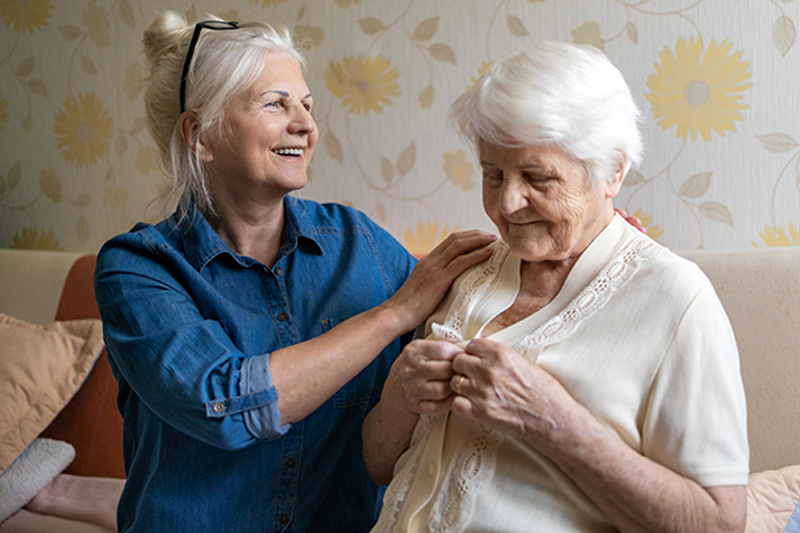
Explore the signs of middle stage dementia and how to help manage care.
Getting the news that a senior loved one has been diagnosed with dementia is life-altering. Thinking through the many different factors and facets associated with the disease as well as its effects, both at present and in the future, can be overwhelming.
In this three-part series, we will examine the early, middle and later stages of dementia. Learn about the type of care needed during each stage, what family caregivers can expect, and how Abby Senior Care, the trusted providers of senior care in Aurora and nearby areas, can help.
Middle Stage Dementia Caregiving
The signs of middle stage dementia come about slowly, and may even be unnoticeable at first. Gradually, a loved one in this stage will begin to experience ever-increasing difficulty with everyday tasks, like getting dressed. It’s vital for family caregivers to continue to foster a sense of independence, allowing the senior to accomplish these tasks at his or her own pace for as long as possible (and as long as it is safe to do so). This requires patience, flexibility, and adaptability.
It will also become necessary to devote additional time to providing care, and to establish creative techniques and approaches to minimize frustration – for your loved one as well as for yourself. Self-care becomes very important in the middle stage of dementia in order to help caregivers manage stress.
Here is what you might expect to experience in this stage:
Behavior Changes
- Anxiety
- Impatience
- Depression
- Repetitive behaviors
- Aggressive outbursts (physical and/or verbal)
Tips on How to Help
Maintaining a calm attitude is critical. Do not argue or try to reason with a person in the middle stage of dementia. In a soothing and calm tone, acknowledge the feeling behind the behavior and provide suggestions in order to help. As an example: “Mom, I can see you’re feeling frustrated about misplacing your favorite shirt. It is probably in the washing machine. This yellow one looks beautiful on you; do you want to wear it today?”
Be aware that the words and actions being conveyed are not a reflection of you personally, but simply part of the normal progression of dementia. Many times, there is an underlying emotion, such as fear, exhaustion, or hunger, driving the behavior. Make an attempt to identify the root cause and tackle that.
Communication Changes
- Losing train of thought
- Forgetting a word
- Repeating statements or questions
- Using more non-verbal communication
Tips on How to Help
Accept whatever form of communication is effective for the older adult, without trying to correct him or her. Adjust your communication technique to make it simpler and easier for the individual to understand and respond to you. For instance, instead of asking open-ended questions (“What would you like for dinner today?”) offer an option between just two options (“Would you like tuna or chicken for dinner today?”). Speak in a clear, gentle tone, and permit the senior plenty of time to reply without jumping in and providing the answer yourself.
Safety-Related Changes
- Wandering
- Driving concerns
- Sundowning
In this stage of the disease, paying closer attention to safety issues becomes crucial. Driving should cease – something that’s often hard for older adults to accept. If possible, include the senior in making this decision. If not, a note from the physician prohibiting driving is often the most effective way to gain his/her consent. If the senior is insistent about continuing to drive, you may have to take away the keys, or exchange his or her set of keys with nonworking ones.
Additionally, sundowning and wandering are often alarming and hard for family caregivers to manage independently. Partnering with an experienced provider of dementia and senior care in Aurora, CO and the surrounding areas, like Abby Senior Care, is a great solution. Our caregivers can take the night shift, making sure that seniors are safe and distracted with interesting activities when not able to sleep – enabling family caregivers to get the rest they need.
For more information regarding our specialized in-home dementia care and to learn how we can help a senior you love with in-home care needs, reach out to us at 303-699-8840 to set up a free consultation at any time.
